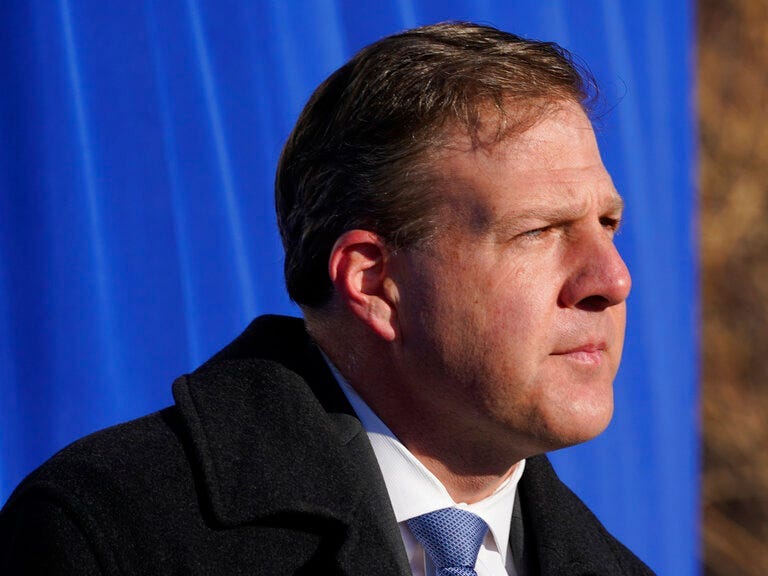- New Hampshire Gov. Sununu said on CNN's State of the Union that he opposes student loan forgiveness.
- He called education debt relief is "inherently unfair" and Biden's loan cancellation "fairly illegal."
- New Hampshire residents have among the highest rates of student loan indebtedness in the country.
New Hampshire GOP Gov. Chris Sununu said on CNN's State of the Union Sunday that he opposes loan forgiveness measures, despite the benefits the financial relief could offer to his constituents.
Sununu's home state is ranked as having the highest rate of student loan indebtedness this year by personal finance site WalletHub, with an average of $34,085 in outstanding loans, according to the Education Data Initiative.
"I take kind of exception with individuals, especially out of Washington, saying, this is a student loan crisis," Sununu told CNN's Dana Bash. "What's the crisis? Folks get a degree. They get a job. We have more high-paying jobs than ever before for young people. They're low-interest loans. They have been deferred for a couple of years."
Nationwide, the average federal student loan debt balance is $37,667, an amount that 83% of non-homeowners say is preventing them from buying a home, according to the National Association of Realtors. Prior to the moratorium on student loan payments implemented during the pandemic, the average monthly loan payment was $300.
"The average loan is — it's high," Sununu told CNN. "It's about $43,000 in America. That's a lot of money. But you can write that $200 or $300 check a month and pay it. One thing I looked at which was kind of interesting, we have — the average home loan in America is about $240,000, right, five times — four or five times what the student loan is. Do we have a home loan crisis, right? How about auto loans? Are we going to pay off auto loans next?"
Federal student loans for undergraduates currently have an interest rate of 4.99 percent for the 2022-23 school year, while graduate students have interest rates of 6.54 percent or 7.54 percent for unsubsidized and PLUS loans. Comparatively, the average interest rate for a new car is 4.07% and the average interest on a 15-year fixed rate mortgage is 5.08%.
Just under 10% of mortgage loans in 2020 were backed by Federal Housing Administration loans, while about 92% of student loans are held by the Department of Education.
Prior to the administration of Bill Clinton, the federal government owned zero student loans, but the debts now account for nearly 20% of all US government assets, according to a 2020 financial report. In the event of defaulting on a loan, the government has wide-reaching abilities to get their funds back, including garnishing wages and tax returns. Student loans are also more difficult to discharge in bankruptcy than other types of loans.
"[I]t's inherently unfair, right?" Sununu told CNN. "It's arbitrarily picking a group of individuals, and we're going to arbitrarily just cancel their debt with a stroke of a pen, which, again, not even going through Congress. That's fairly illegal. It adds hundreds of billions of dollars at a time where we're trying to bring inflation under control. That's exacerbating the inflationary crisis."
While some lawmakers, largely Republican, have questioned the legality of President Biden's action this week to forgive between $10,000 and $20,000 in debt for federal borrowers making under $125,000, the White House argued the Higher Education Relief Opportunities for Students ("HEROES") Act of 2003 — first enacted in the wake of the September 11 attacks to grant relief from student loan requirements during specific periods of national emergency — "grants the Secretary [of Education] authority that could be used to effectuate a program of targeted loan cancellation directed at addressing the financial harms of the COVID-19 pandemic."
Representatives for Sununu did not immediately respond to Insider's request for comment.
